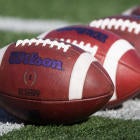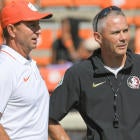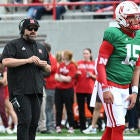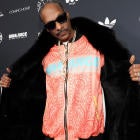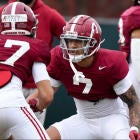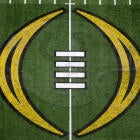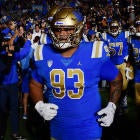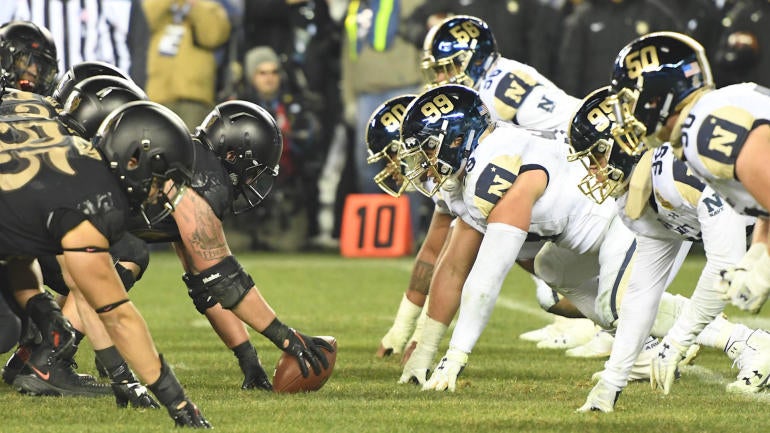
When Cam Kinley was young, too young to know better, he would watch the Army-Navy Game on television and wonder.
"Are they going to war after this game?" Navy's 21-year-old senior captain recalled this week. "Is this a little break that they're [taking]?"
It's not quite that simple. Never had been. Yes, some of the cadets and midshipmen playing in the 121st Army-Navy Game will see battle. All of them will fondly recall Saturday's experience as enriching, perhaps life-changing and definitely needed in this damnable year. The break they're taking this weekend is three hours in the midst of unprecedented hardship to drink in every drop of the glory they deserve.
When COVID-19 struck college football, it didn't spare the service academies. In fact, it might have hit them the hardest. Our country's best and brightest didn't blink. Kinley is among those at both academies who have been on lockdown as the game approaches. They all grinded through finals this week. Their games have been postponed and canceled. They have been hurt, disappointed. Some of them even tested positive for the coronavirus.
But they endured it all having to live up to a certain standard: None of this would break them.
That's why Kinley, Navy's senior class president and Midshipmen starting cornerback, is already crafting his graduation speech months ahead of schedule. At the same time, he is practicing football for the last time.
"Simply put, it's everything," Kinley said. "We know what's at stake, what's on the line this weekend. Beating Army heals all the pain you've experienced this season, all the adversity that you've been through, all the struggles that you've been through in the COVID pandemic. Beating Army heals all of that and makes all of it worth it."
The experiences of hundreds of academy athletes could be singled out entering "America's Game." Kinley was easy to settle on. As class president, he serves as a liaison to the academy's superior officers. The position has been described as one of the highest a midshipman can achieve.
In grade school, something compelled Kinley to write an essay on the meaning of being a Naval Academy athlete. He keeps three daily planners. He genuinely wants to be President of the United States someday. The political science major looks to nearby to Washington, D.C. and has no problem analyzing what it means to adhere to the words of an old Army veteran, Gen. Douglas MacArthur.
Duty, honor, country.
"I feel like we're losing site of the goal in Washington, which is to make the decisions best for the American people," Kinley said.
You think your team has problems? None of them had the added duty of, well, duty. These cadets and midshipmen are excelling in the classroom, serving the country, literally having to get better every day while the coronavirus held them down.
Navy went 28 days without playing a game. A November outbreak at West Point caused 110 Army cadets to be quarantined. Black Knights coach Jeff Monken was more than ticked off that the Air Force game couldn't be played because of COVID-19.
"We mitigate risks all the time in the military," Monken said at the time. "That's what we do, and part of the military is … we don't stop. The American people are counting on the military to keep going no matter what's going on.''
So, you see, it goes beyond these three hours on Saturday. The players will be asked to set an example beyond this weekend. Kinley is already thinking about what he will tell his teammates.
"This is bigger than football," Kinley said. "Bigger than sports. You are capable of so much more. Do not limit yourself to just being athlete. You're ultimately representing the country on the field playing a game that you love. It doesn't really get better than that."
Army-Navy has always been about the best of us. This season that has included elite athletes/students staring at four walls for hours at a time. Not counting road trips, since Army West Point players have been allowed off post for "walking privileges" -- off the grounds but no overnight stays -- for only two weekends since June 1. Navy's players have been free for a total of five nights.
"Anxiety, depression, guys being locked away in a room all the time -- it took a toll on them," Navy coach Ken Niumatalolo said. "The teams that are playing better, some had better talent. I think a lot of teams were able to deal with [the mental aspect] better."
At one point, Niumatalolo took his team outside, socially distanced, "just to see the sun."
"In terms of lockdown, there's nobody that's had it like us," Monken said. "At a traditional school, they have their pseudo-bubble but kids can still jump in their car, go through a McDonald's drive-thru. A girlfriend comes over to his apartment. None of that is happening here."
It goes beyond the health and welfare of student-athletes. The season proved you can play a game with significantly less than 85 players on scholarship. BYU-Coastal Carolina proved games can be scheduled on 48 hours notice.
But in the case of Army-Navy, COVID-19 becomes a case of national security. If the country needs football during this crisis, this is the example.
"What should we do, just sit around and wait and not live our lives and be held hostage by a virus we can't control?" Monken asked.
For the first time since World War II, the teams are playing at Army's Michie Stadium. Philadelphia has hosted the game for 89 of its 120 years. The city decided to pass this year because of concerns about COVID-19.
The only attendees in 38,000-seat Michie Saturday will be the Corps of Cadets and the Brigade of Midshipmen. Usually, they would march into a packed NFL stadium full of glory and hope and pride. This year?
"I've told our players it may never be here again, so let's defend our turf," Monken said.
West Point will host this game for the first time since 1943. The only other time it was played here was when the rivalry began in 1890.
"I know as soon as I enter the gates on campus, I'm going to have a feeling of disgust in me [on the field], just a feeling of not being welcome," Kinley said. "My little brother plays for Middle Tennessee. He Facetimed [after playing at Army] and said, 'It looks like Hogwarts. It looks like Harry Potter up here.'"
The United States Military Academy actually drips with real history -- history to be respected and honored. The campus overlooks the Hudson River which, 242 years ago, George Washington identified as the most strategic position in America during the Revolutionary War. Scattered throughout the post are statues of Eisenhower, MacArthur, Patton. You should know their first names.
The best of us roam a 16,000-acre campus undeterred by the coronavirus.
"You usually see dozens of kids working out and running and doing burpees in the grass," Army athletic director Mike Buddie said. "They're still doing it. They're just 15 feet apart."
COVID-19 shortened Beast Barracks -- cadet basic training for first-year plebes – last summer but didn't eliminate it. The mission goes on.
"There is a resiliency built into these young men and women here," Monken said. "Most college students would say, 'Forget this.' They'd wave the white flag and say this isn't what college is supposed to be about. For them to endure this … they've got to have a mental toughness about them that's beyond the common man."
Army Chief of Staff Gen. James McConville set the tone early during the pandemic.
"We can't telecommute to combat," he said.
On the field, Navy is a disappointing 3-6. The season started with a planned trip to Dublin, Ireland, to play Notre Dame moved to Navy-Marine Corps Stadium. Then the game was canceled.
Worse, the Midshipmen haven't been the usual road grading triple option force Niumatalolo has crafted over his 14 years as coach and 10 before that as an offensive assistant. He still wears the embarrassment of choosing not to tackle in preseason drills (for COVID-19 purposes) prior to the opener against BYU. The Cougars won 55-3.
"When you're this inept on offense, everybody is at fault," Niumatalolo said. "It starts with me."
Meanwhile, Army is 7-2. Win the last three and this senior class will be the winningest in history. For the fifth consecutive season, the Black Knights are ranked in the top three nationally in rushing.
There is a wonder -- other than that from a young Kinley -- about how all of it will look as a true home game for Army. Niumatalolo is used to dodging presidents who might choose to walk through pregame seven-on-seven drills.
"You don't know whether to yell at the president, 'Get off the field, you're going to get hit by a curl route,' or take your chances [that] one of the Secret Service guys is going to take you down," the coach joked.
Niumatalolo's first Army-Navy Game was played in Philadelphia in 1995. He still savors the run-up to the game each December.
"We'll see what it's going to be like there at West Point," he said. "It's kind of the gladiator movie where they're in there and it's kind of quiet and you come out and there's just this roar. That's what it's like. Not only audibly, but there's a rush."
There will be heroes everywhere at Michie Stadium, not just the ones we lazily label when they score touchdowns.
Army defensive end Amadeo West has survived three consecutive season-ending injuries. The California native was nominated this week for the Courage Award. Sponsored by the Orange Bowl and Football Writers Association of America, the award goes the player judged most courageous on and off the field who has overcome an injury or disability.
Navy offensive lineman David Forney died in February due to cardiac arrest. Forney played on a line that helped the Midshipmen lead the nation in rushing and beat Army last year. Teammate Billy Honaker will wear Forney's No. 68 for the first time Saturday as a tribute.
"Losing Dave was probably the hardest moment of my life," Honaker told the Capital-Gazette.
They all will play with the zeal of those gladiators. Also with desperation.
Kinley and the rest of those seniors don't have the NCAA-awarded luxury of an extra year of eligibility given to every other college football player amid the pandemic. After this, their country needs them.
"This time next year, when everybody else is a fifth-year senior, our young men are going to be in harm's way defending the Constitution," Buddie said.













